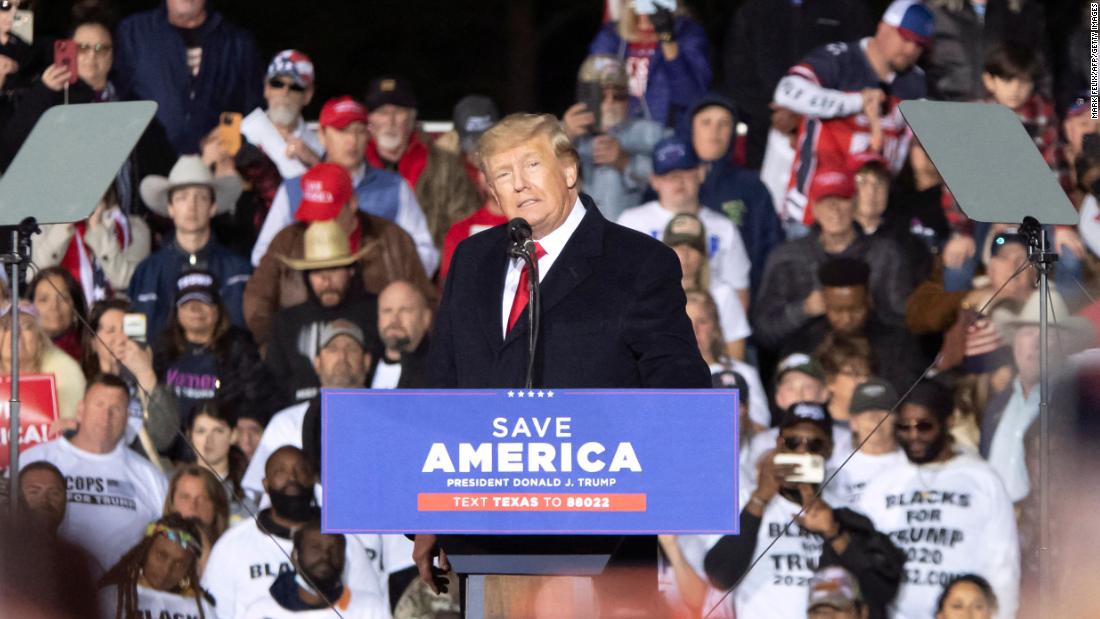Republicans balk at Trump’s defense of January 6 rioters but would back him as 2024 nominee
The response from the GOP? A collective shrug.
The reaction underscored the hold that Trump continues to maintain a year after leaving office, despite having been impeached twice and losing both houses of Congress under his tumultuous four years in office.
“If he feels like … there were people that were unjustly detained, wrongfully detained, he has every right in the world to do that, to pardon if he wants to do that,” said Sen. Kevin Cramer, a North Dakota Republican. “But you guys, we have a President in the White House that is one awful decision after another harming our country.”
Sen. Rick Scott, who chairs the National Republican Senatorial Committee, would not detail his view of Trump’s vow to pardon the insurrections, instead pointing to how he handled pardons when he served as the governor of Florida.
“The way I would do it is go through every case, everybody’s cases, and that’s what I did when I was governor, case by case,” Scott said repeatedly.
Trump’s most recent comments, made at the Texas campaign-style rally and in a statement the next day, echoed some of the inflammatory statements and falsehoods he made in the lead-up to the deadly attack on the Capitol — the very same rhetoric that many Republicans harshly condemned after January 6.
Still, most Republicans would rather keep 2020 and the deadly insurrection in the rearview mirror — a goal that is going to be increasingly difficult to achieve with Trump now making his embrace of January 6 the centerpiece of his message on the campaign trail.
Sen. Chuck Grassley, the ranking Republican on the Senate Judiciary Committee, who has been endorsed by Trump in his reelection bid in Iowa, declined to weigh in.
“That’s speculation,” Grassley said. “I can’t speculate on anything. We got President Biden.”
Some of Trump’s closest allies on the Hill also ducked questions from reporters. Sen. Ron Johnson, who is running for reelection in the battleground state of Wisconsin, said he hadn’t seen Trump’s statements. And Sen. Josh Hawley of Missouri said he would “never judge the appropriateness or not of his comments. … That’s not my role.”
Sen. Mike Braun of Indiana said he listened to Trump’s comments at the Texas rally, “and I didn’t really think much about it.”
“Because he says a lot of things that, at the rallies, that I don’t know if he means it or not,” Braun said. “So I don’t know if that’s helping or not.”
And Braun echoed what a number of GOP senators said on Monday: That they could support Trump again if he became the nominee.
“I’m going to support whoever the Republican nominee is,” Braun said.
Sen. John Cornyn, a Texas Republican and member of McConnell’s leadership team, said of the potential pardons: “I just think people who broke the law on January the 6th need to be held accountable. Period.”
But when asked if he could back Trump again in two years, Cornyn said: “I will support the nominee of my political party.”
Added Senate Minority Whip John Thune, who has made his distaste with Trump’s lies about a stolen election well known, said suggesting the rioters won’t be held accountable is “only going to encourage unlawful behavior.”
And when asked about Trump’s view that Pence could have overturned the election, the South Dakota Republican added: “I’m very much of the view that, with Mike Pence, that he didn’t have that authority. But you know, I mean, there’s nothing any of us are going to do to control what the former President does on it, on that and other issues.”
But what if he runs again?
“What I’ve said is I’ll support our nominee,” Thune added. Asked about Trump as the nominee, he said: “I’ll support our nominee.”
Others are a little more hesitant — even if they didn’t completely shut the door.
Thune’s South Dakota colleague, Sen. Mike Rounds, who was recently lambasted by Trump after asserting the fact that Biden won the election, said he didn’t think Trump’s pardon pledge was appropriate and he wouldn’t support it.
But he also hopes to support the GOP nominee in 2024.
“I’ve so far been able to do that. We’ll see if that is the case in 2024. Hopefully it will be,” Rounds said.
While some GOP lawmakers recoiled at Trump’s pardon talk, they were careful to avoid directly condemning the former President. Sen. Bill Cassidy of Louisiana, who voted to convict Trump last year, called his pardon remarks “terribly inappropriate.” Retiring Sen. Pat Toomey of Pennsylvania, who also voted to convict Trump, said people who are convicted of a crime need to “serve whatever sentence they are given.”
“To me, President Trump’s comments, underscore the need for us to revise the Electoral Count Act because they demonstrated the confusion in the law and the fact that it is ambiguous,” said Collins, who is leading a bipartisan effort to reform the law. “I think the 12th Amendment’s pretty clear, but the Electoral Count Act, which was written in 1887, clearly needs to be revised.”
Yet the harshest pushback in the GOP came from the usual places: Cheney and Kinzinger.
“Trump uses language he knows caused the Jan 6 violence; suggests he’d pardon the Jan 6 defendants, some of whom have been charged with seditious conspiracy; threatens prosecutors; and admits he was attempting to overturn the election,” Cheney tweeted Monday. “He’d do it all again if given the chance.”
And Kinzinger, who is retiring, took aim at Trump’s false claim that former Vice President Mike Pence could have overturned the election results on January 6, calling it “an admission, and a massively un-American statement.”
“It is time for every Republican leader to pick a side… Trump or the Constitution, there is no middle on defending our nation anymore,” he tweeted.
Morgan Rimmer contributed to this report.
![]()


